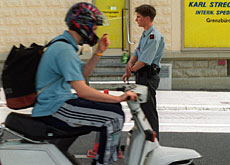Labour market digests bilateral changes

The free movement of people between Switzerland and the European Union has not led to heavy immigration, wage dumping or more jobless, a report says.
An analysis of the accord from the State Secretariat for Economic Affairs (Seco) says that the introduction of the accord in 2002 has gone smoothly.
The report, published on Tuesday by the Seco and the Federal offices for migration and statistics, outlines the effects for Switzerland of the June 2002 accord between Bern and the then 15-member EU.
Since the accord came into force, immigration has not increased – as feared by opponents of the accord who forced a referendum on the issue – but decreased. This is typical of a weak economy, it adds.
During the first year of the accord, the number of people migrating to Switzerland fell from 57,710 to 53,813 before dropping to 46,220 in the second year.
There was a slight increase in immigrants from countries of the EU and the European Free Trade Association, particularly from Germany and Portugal.
Residence restrictions
But a drop in the number of people from so-called “third” countries, who have restricted access to residence permits, compensated this.
The trend has been “in keeping with the expectations and needs of the economy”, the Seco said in a statement.
It added that bearing in mind the weak economy, demand for foreign labour was relatively high.
This, it said, was a sign of the need for Swiss companies to catch up in terms of recruiting European workers, not only those who were highly qualified, but also those specialised in such branches as hotels and health.
At the regional level, there was a greater immigration noted particularly in the Geneva area. The east of Switzerland and the southern canton of Ticino also felt this trend, but to a lesser extent.
No impact
According to the report, the free movement of people had no decisive impact on the unemployment situation.
And the rate of jobless among the Swiss was way below that of foreign workers.
The report also said that commissions responsible for monitoring the labour market had found that salary and working conditions had been “very largely respected”.
Out of 3,500 checks among 14,000 people, only 812 infringements had been noted, that is a rate of less than six per cent.
swissinfo with agencies
During the first 12 months of the accord, the number of people migrating to Switzerland fell from 57,710 to 53,813 before falling to 46,220 in the second year.
Out of 3,500 labour controls among 14,000 people, only 812 infringements were noted, that is a rate of less than six per cent.
The bilateral agreement between Switzerland and the EU on the free movement of people came into force on June 1, 2002.
This eases residence and working restrictions on Swiss and residents of the 15 old EU member states.
The agreement should also apply to the ten countries that joined the EU on May 1, 2004: Estonia, Latvia, Lithuania, Poland, Slovakia, Slovenia, the Czech Republic, Hungary, Cyprus and Malta.
The Swiss Democrats are against the extension and collected enough signatures to force a nationwide vote on September 25.

In compliance with the JTI standards
More: SWI swissinfo.ch certified by the Journalism Trust Initiative



You can find an overview of ongoing debates with our journalists here. Please join us!
If you want to start a conversation about a topic raised in this article or want to report factual errors, email us at english@swissinfo.ch.